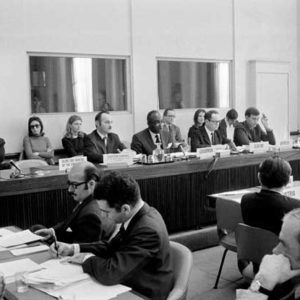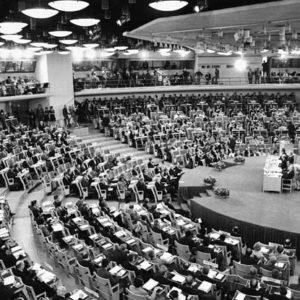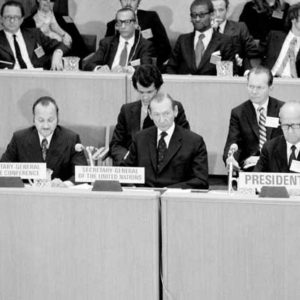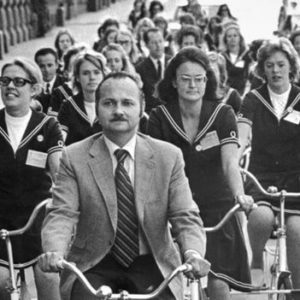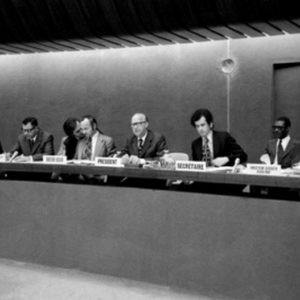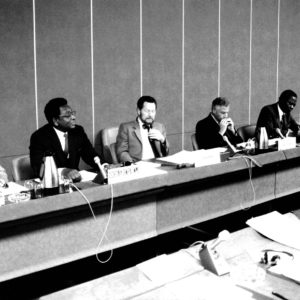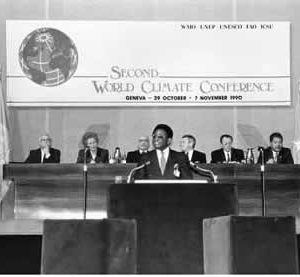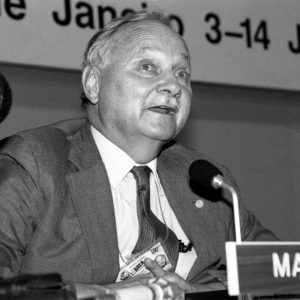Environment in Geneva | History
Geneva and its surrounding area have been active in global environmental governance for more than 50 years. In addition, important and strategic historical meetings have taken place in the region.
Prior to the establishment of the United Nations Environment Programme (UNEP)
1951
The World Meteorological Organization (WMO), created by the World Meteorological Convention, was adopted in 1947 at the 12th Director’s Conference of the International Meteorological Organization (IMO). Headquartered in Geneva, the WMO began operations in 1951.
1955
The First International Conference on Peaceful Uses of Atomic Energy was held in Geneva.
1958
The United Nations Conference on the Law of the Sea opened for signature four conventions and an optional protocol: the Convention on the Territorial Sea and the Contiguous Zone (CTS); the Convention on the High Seas (CHS); the Convention on Fishing and Conservation of the Living Resources of the High Seas (CFCLR); the Convention on the Continental Shelf (CCS); and the Optional Protocol of Signature concerning the Compulsory Settlement of Disputes (OPSD). The Conventions and Protocol are the product of the (first) United Nations Conference on the Law of the Sea, held in Geneva on 24 February – 27 April 1958.
1958
The Second International Conference on Peaceful Uses of Atomic Energy was held in Geneva. More than 6.000 scientists took part in the Conference.
1961
The headquarters of the International Union for Conservation of Nature (IUCN) moved to Morges, near Geneva, from Belgium. In the same year, eminent scientists and business personalities decided to establish a complementary fund, the World Wildlife Fund (WWF), to focus on fundraising, public relations, and increasing public support for nature conservation. The Morges Manifesto founding document signaled the very beginning of WWF as we know it today.
1970
The Club of Rome was officially founded in June 1970 in Geneva as a private nonprofit organization according to Swiss law.
1971
The Stockholm Conference Secretariat was established in Geneva in January.
1971
The United Nations Conference on the Human Environment Secretariat initiated plans for an in-depth seminar on the development-environment issue, held in Founex. The subsequent Founex Report played a critical role in laying the ground work for the 1972 Stockholm Conference. The report noted that while concerns about the environment sprang from the production and consumption patterns of the industrialized world, many of the environmental problems on the planet were a result of underdevelopment and poverty. This acknowledgement was a factor in persuading many developing countries to attend the 1972 Stockholm Conference.
Following the establishment of UNEP
1972
The General Assembly passed resolution A/RES/2997(XXVII) establishing the United Nations Environment Programme (UNEP), to be headquartered in Nairobi, Kenya.
1973
The First Governing Council of UNEP took place in Geneva on 12-22 June 1973. Additionally, the Regional Office for Europe was established in Geneva.
1975
The Convention on International Trade in Endangered Species of Wild Fauna and Flora (CITES) came into effect with the Secretariat located in Morges. CITES subsequently moved to Geneva.
1979
The 1st World Climate Conference was organized in Geneva with sponsorship from the WMO. The conference focused on the scientific aspects of climate change and was one of the first global conferences on the subject.
1982
The World Climate Programme (WCP – WMO/UNEP/ICSU) meeting in Geneva recommended that continuing assessments of C02, believed to be responsible for global warming, be held every five years, starting from the first meeting in 1980.
1983
The World Commission on Environment and Development, also known as the Brundtland Commission, was established. In May 1984, an organizational meeting of the Commission was held in Geneva to adopt its rules of procedure, its operation and to appoint a Secretary General to guide its work. In July 1984, the Secretariat was established in Geneva. Its temporary location was the Centre de Morillon and, afterwards, was permanently moved to Palais Wilson.
1985
The two original GRID centres are established in Nairobi and in Geneva.
1987
Our Common Future, also known as the Brundtland Report, was published providing information and guidance for developing comprehensive global solutions. It also contributed to the popularization of the term “sustainable development.”
1988
The Intergovernmental Panel on Climate Change (IPCC) was established with three working groups to assess scientific, technical and socio-economic research in the field of climate change. The IPCC Secretariat is based in Geneva.
1988
The Centre for Our Common Future was founded in Geneva as a focal point for follow-up activities to the Brundtland Report.
1990
The IPCC published the “First Assessment Report” on climate change focusing on scientific research, impacts assessments, and response strategies.
1990
The 2nd Climate Conference was held on 29 October – 7 November 1990 in Geneva. The IPCC’s first assessment report had been completed in time for this conference. The scientists and technology experts at the conference issued a strong statement highlighting the risk of climate change. The conference issued a Ministerial Declaration and also led to the establishment of the United Nations Framework Convention on Climate Change (UNFCCC) and the Global Climate Observing System (GCOS), a global observing system for climate and other related observations.
1991
Two of the four PrepCom meetings of the Rio Earth Summit took place in Geneva where the Secretariat of the United Nations Conference on the Environment and Development (UNCED) was based.
1991
The International Academy of the Environment was established by the Swiss Confederation and the Canton of Geneva in order to create an institutionalized link between science and decision-making in the environmental dimension of sustainable development.
1992
The Geneva and the Environment directory was published by Michael Foley Associates, the former International Academy of the Environment, and the Canton of Geneva.
Following the Rio Earth Summit
After the Rio Earth Summit in 1992, Geneva started gaining environmental expertise, including the establishment of new organizations and programmes, and the development of new thematic areas such as e-waste and green technologies.
1993
The 1st Session of the Intergovernmental Committee on the Convention on Biological Diversity (ICCBD) met in Geneva on 11-15 October 1993. The meeting was convened by the Executive Director of UNEP with the objective of preparing for the first meeting of the Conference of the Parties and ensuring an early and effective operation of the Convention once it enters into force. The ICCBD was established in May 1993 by the UNEP Governing Council.
1996
The 2nd Session of the Intergovernmental Panel on Forests (IPF) was held on 11-22 March 1996 in Geneva. Delegates conducted the first discussions of the programme’s elements, including the underlying causes of deforestation and forest degradation, the needs and requirements of countries with low forest cover, and international cooperation in financial assistance and technology transfer for sustainable forest management.
1996
The 2nd Conference of the Parties (COP2) to the United Nations Framework Convention on Climate Change (FCCC) met in Geneva on 8-19 July 1996. The COP concluded by noting the “Geneva Declaration,” which endorses the IPCC conclusions and calls for legally binding objectives and significant reductions in greenhouse gas (GHG) emissions.
1996
The 3rd Session of the Intergovernmental Panel on Forests (IPF) was held on 9-20 September 1996 in Geneva.
1997
The WTO’s first Symposium on Trade, Environment and Sustainable Development was convened from 20-21 May 1997 in Geneva and attended by over 70 NGOs.
1997
The 3rd Session of the Intergovernmental Negotiating Committee (INC3) for an International Legally Binding Instrument for the Application of the Prior Informed Consent (PIC) procedure for Certain Hazardous Chemicals and
Pesticides in International Trade was held on 26-30 May 1997 in Geneva.
1998
The second WTO’s Symposium on Trade, Environment and Sustainable Development was held at the WTO in Geneva from 17-18 March 1998. The Symposium was attended by over 150 individuals representing environment and development NGOs, private corporations, research and academic institutes, and over 60 individuals representing Member governments. The objective of the Symposium, organized by the WTO Secretariat, was to broaden and deepen the constructive dialogue between NGOs and the WTO on the relationship between international trade, environmental policies and sustainable development.
1998
The 2nd Session of the Intergovernmental Forum on Forests (IFF2) took place on 24 August – 4 September in Geneva. During the session, delegates conducted discussions on promoting and facilitating implementation of the proposals for action of the IPF, forest-related work of international and regional organizations and existing instruments, and matters left pending on trade, the environment and transfer of environmentally sound technologies (ESTs).
1999
The Geneva Environment Network was established with the support of the Swiss Federal Office for the Environment. In addition, the International Environment House was inaugurated by the Swiss Federal Office for the Environment and the Canton of Geneva, in the presence of UNEP’s Executive Director.
1999
The World Trade Organization (WTO) High Level Symposium on Trade and Environment was held at the WTO in Geneva from 15-16 March 1999. The Symposium was divided into three panels to consider: linkages between trade and environment policies; synergies between trade liberalization, environmental protection, sustained economic growth and sustainable development; and interaction between trade and environment communities.
1999
The 3rd Session of the Intergovernmental Forum on Forests (IFF3) took place on 3-14 May 1999 in Geneva. Over the course of the meeting, delegates conducted discussions on monitoring progress in the implementation of the IPF’s proposals for action, financial resources and issues needing further clarification.
1999
The 3rd Session of the International Negotiating Committee (INC3) for an International Legally Binding Instrument for Implementing International Action on Certain Persistent Organic Pollutants (POPs) was held on 6-11 September 1999 in Geneva. Delegates convened to continue preparation of an international legally binding instrument on an initial list of 12 POPs grouped into three categories: pesticides, industrial chemicals, unintended byproducts.
2000
The 7th Session of the Intergovernmental Negotiating Committee for an International Legally Binding Instrument for the Application of the Prior Informed Consent (PIC) Procedure for Certain Hazardous Chemicals and Pesticides in International Trade (INC7) was held on 30 October – 3 November 2000 in Geneva.
2002
The 6th Session of the Intergovernmental Negotiating Committee (INC6) for an International Legally Binding Instrument for Implementing International Action on Certain Persistent Organic Pollutants (POPs) was held on 17-21 June 2002 in Geneva. Delegates discussed, inter alia, the Expert Group on best available techniques and environmental practices, the POPs Review Committee, wastes and stockpiles, and technical assistance.
Following the World Summit on Sustainable Development 2002
The World Summit on Sustainable Development, took place in Johannesburg, South Africa, from 26 August to 4 September 2002.
2002
The 6th Conference of the Parties (COP6) to the Basel Convention on the Control of Transboundary Movements of Hazardous Wastes and their Disposal was held on 9-14 December 2002 in Geneva. The COP considered and adopted decisions on a range of issues relating to the implementation of the Convention, the amendment of the Convention and its annexes, and the institutional, financial and procedural arrangements. Moreover, COP6 agreed on a compliance mechanism for the Convention and adopted a Strategic Plan, among other things.
2003
The 3rd Session of the United Nations Forum on Forests (UNFF3) took place on 26 May – 6 June 2003 in Geneva. During the meeting, delegates addressed progress in the implementation of the Intergovernmental Panel on Forests and the Intergovernmental Forum on Forests’ proposals related to the economic aspects of forests, forest health and productivity, and maintaining forest cover to meet present and future needs. Moreover, UNFF3 adopted decisions on, inter alia, enhanced cooperation on policy and programme coordination, forest health and productivity, and the UNFF Trust Fund. UNFF-3 also approved the voluntary reporting format and the terms of reference for the three ad-hoc expert groups.
2003
The 7th Session of the Intergovernmental Negotiating Committee (INC7) for an International Legally Binding Instrument for Implementing International Action on Certain Persistent Organic Pollutants (POPs) was held on 14-18 July 2003 in Geneva. The Committee decided on, inter alia, offers to host the permanent Secretariat, technical assistance, national implementation plans (NIPs), and exempted use.
2003
The 10th Session of the Intergovernmental Negotiating Committee for an International Legally Binding Instrument for the Application of the Prior Informed Consent Procedure for Certain Hazardous Chemicals and Pesticides in International Trade (INC10) was held on 17-21 November 2003 in Geneva.
Delegates resumed consideration of major issues associated with the implementation of the interim PIC Procedure and preparations for the first Conference of Parties (COP1).
2004
The 4th Session of the United Nations Forum on Forests (UNFF4) was held in Geneva on 3–14 May 2004. UNFF4 adopted five resolutions on the following: social and cultural aspects of forests, forest-related scientific knowledge, monitoring, assessment, reporting, criteria, indicators, finance and transfer of environmentally sound technologies, and the review of the effectiveness of the international arrangement on forests. Delegates failed to adopt resolutions on traditional forest-related knowledge and enhanced cooperation.
2004
The 1st Conference of the Parties to the Rotterdam Convention (COP1) was held on 20-24 September 2004 in Geneva. Immediately preceding COP1, the eleventh session of the Intergovernmental Negotiating Committee for an International Legally Binding Instrument for the Application of the Prior Informed Consent Procedure for Certain Hazardous Chemicals and Pesticides in International Trade (INC-11) was held on 18 September 2004 in Geneva.
At INC-11, delegates agreed to add three new chemicals to the interim PIC Procedure. COP-1 also successfully adopted all the decisions required to make the legally binding PIC Procedure operational. In addition, delegates addressed decisions associated with the entry into force of the Convention and the set up of the COP and subsidiary bodies, such as composition of the PIC regions, adoption of financial rules and provisions, and establishment of the Chemical Review Committee (CRC).
2006
The 2nd Conference of the Parties (COP2) to the Stockholm Convention on Persistent Organic Pollutants (POPs) was held on 1-5 May 2006 in Geneva. COP2 considered several reports on activities within the Convention’s mandate and adopted 18 decisions on, inter alia, DDT, exemptions, financial resources and mechanisms, implementation plans, technical assistance, synergies and effectiveness evaluation.
2006
The 3rd Conference of the Parties (COP3) to the Rotterdam Convention on the Prior Informed Consent (PIC) Procedure for Certain Hazardous Chemicals and Pesticides in International Trade was held on 9-13 October 2006 in Geneva. COP3 considered several reports on activities within the Convention’s mandate and adopted 16 decisions on, inter alia, the programme of work and the budget, implementation of the Convention, financial mechanisms, and cooperation and coordination among the Basel, Rotterdam and Stockholm Conventions’ secretariats.
2006
The 3rd Conference of the Parties (COP3) to the Rotterdam Convention on the Prior Informed Consent (PIC) Procedure for Certain Hazardous Chemicals and Pesticides in International Trade was held on 9-13 October 2006 in Geneva. COP3 considered several reports on activities within the Convention’s mandate and adopted 16 decisions on, inter alia, the programme of work and the budget for 2007-2008, implementation of the Convention, financial mechanisms, non-compliance, and cooperation and coordination among the Basel, Rotterdam and Stockholm Conventions’ secretariats.
2007
UN Secretary General Ban Ki-Moon mandated all organizations to green their activities and to work on climate change, two years before the Copenhagen Conference on Climate Change.
2007
The 3rd Meeting of the Persistent Organic Pollutants Review Committee (POPRC3) of the Stockholm Convention on Persistent Organic Pollutants (POPs) was held on 19-23 November 2007 in Geneva. The Committee approved the risk management evaluation for five chemicals and recommended that COP4 consider listing under one of its Annexes 7 chemicals. Risk profiles were approved for four chemicals and the draft risk management evaluations for four chemicals was being prepared. Five chemicals were slated to reach the final and third step of the review process. A further five entered the second phase and one new chemical was nominated. As such, POPRC3 was an opportunity for the Committee to draw on experience gained during the previous two meetings and make recommendations to the COP.
2007
Ministers of the Environment from the G8+5 countries meeting in Potsdam, Germany, proposed to study the global economic benefit of biological diversity, the costs of the loss of biodiversity and the failure to take protective measures versus the costs of effective conservation. This proposal led to the establishment of The Economics of Ecosystems and Biodiversity (TEEB) in Geneva.
2008
The 6th Meeting of the Ad Hoc Open-ended Working Group on Access and Benefit-sharing (ABS) of the Convention on Biological Diversity (CBD) was held on 21-25 January 2008 in Geneva. In a continuation of its fifth meeting, held in October 2007, the Working Group proceeded with the elaboration and negotiation of an international regime on ABS, under the co-chairmanship of Fernando Casas (Colombia) and Timothy Hodges (Canada).
2008
The 29th Session of the Intergovernmental Panel on Climate Change (IPCC) was held on 31 August – 4 September 2008 in Geneva and was attended by more than 300 participants. During the meeting, which commemorated the IPCC’s 20th anniversary, the Panel elected the new IPCC Bureau and the Bureau of the Task Force on National Greenhouse Gas Inventories (TFB) and reelected Rajendra Pachauri as the IPCC Chair. The result of Bureau elections left delegates satisfied although some felt frustrated with the lack of clarity in the Rules of Procedure. The Panel also continued its discussions on the future of the IPCC, agreed to create a scholarship for young climate change scientists from developing countries with the funds from the Nobel Prize and asked the Bureau to consider a scoping meeting on disaster risk reduction.
2008
The 4th Meeting of the Persistent Organic Pollutants Review Committee (POPRC4) of the Stockholm Convention on Persistent Organic Pollutants (POPs) was held on 13-17 October 2008 in Geneva. The Committee approved the risk management evaluation of four chemicals and recommended that COP4 consider listing under one of its Annexes 4 new chemicals. POPRC4 also evaluated a proposal to list one new chemical under the Convention and began an exchange of views on a proposal to list another new chemical under the Convention.
2009
The Institute for Environmental Sciences (ISE), an interfaculty institute of the University of Geneva, was established in March 2009.
2009
The 4th Conference of the Parties (COP4) to the Stockholm Convention on Persistent Organic Pollutants (POPs) was held on 4-8 May 2009 in Geneva.
COP4 reached an agreement on new chemicals to be added to the Convention, on financial resources and on technical assistance. There was no agreement on a non-compliance mechanism.
2009
The 2nd Session of the International Conference on Chemicals Management (ICCM2) convened in Geneva to review the progress of the Strategic Approach to International Chemicals Management (SAICM) and to discuss new policy issues such as e-waste and nanotechnology, among others.
2009
The 3rd World Climate Conference was held on 31 August – 4 September 2009 in Geneva, focusing on issuing predictions and on better linking predictions, at the seasonal to multi-decadal timescales.
2009
The 5th Meeting of the Persistent Organic Pollutants Review Committee (POPRC5) of the Stockholm Convention on Persistent Organic Pollutants (POPs) was held on 12-16 October 2009 in Geneva. POPRC5 addressed several operational issues, including, inter alia, work programmes on new POPs, substitutions and alternatives, toxicological interactions, and activities undertaken for effective participation in the work of the Committee. The POPRC also considered the draft risk profiles for two new chemicals and discussed whether one other chemical met the Annex D criteria for listing under the Stockholm Convention.
2010
The 6th Meeting of the Persistent Organic Pollutants Review Committee (POPRC6) of the Stockholm Convention on Persistent Organic Pollutants (POPs) was held on 11-15 October 2010 in Geneva. POPRC6 adopted 12 decisions, including support for effective participation in POPRC’s work, the work programmes on new POPs, and intersessional work on toxic interactions. POPRC also adopted the risk profile for one chemical, agreed on the risk management and evaluation for another chemical, and considered a revised draft risk profile for another chemical product.
2010
The 30th Open-Ended Working Group of the Parties to the Montreal Protocol on Substances that Deplete the Ozone Layer met in Geneva to discuss the financial mechanism, hydrochlorofluorocarbons (HCFCs) and environmentally sound management of banks of ozone-depleting substances.
2011
The IPCC published “Renewable Energy Sources and Climate Change Mitigation” assessing the literature on the scientific, technological, environmental, economic and social aspects of the contribution of renewable energy sources to the mitigation of climate change.
2011
The 5th Conference of the Parties (COP5) to the Stockholm Convention on Persistent Organic Pollutants (POPs) was held on 25-29 April 2011 in Geneva. COP5 considered several reports on activities within the Convention’s mandate and adopted over 30 decisions on, inter alia, listing endosulfan in Annex A of the Convention, financial and technical assistance, synergies, and endorsing seven new Stockholm Convention regional centres in Algeria, Senegal, Kenya, South Africa, Iran, India and the Russian Federation. The adoption of the decision to list endosulfan in Annex A was seen by non-governmental organization representatives as historic, indicating the Convention remains dynamic, and moving ever closer to its goal of protecting human health and the environment from POPs.
2011
The 5th Conference of the Parties (COP5) to the Rotterdam Convention on the Prior Informed Consent Procedure (PIC) for Certain Hazardous Chemicals and Pesticides in International Trade convened on 20-24 June 2011 in Geneva. COP5 adopted 13 decisions, including on the addition of aldicarb, alachlor and endosulfan to Annex III of the Convention (chemicals subject to the PIC procedure).
2011
The seventh meeting of the Persistent Organic Pollutants Review Committee (POPRC7) of the Stockholm Convention on Persistent Organic Pollutants (POPs) was held on 10-14 October 2011 in Geneva. POPRC7 adopted 12 decisions, including advancing two chemicals to the risk profile stage, recommending parties consider listing one new chemical in Annexes A, B, and/or C of the Convention, effective participation in the Committee’s work, and the implications of climate change on POPs.
2012
The 8th Meeting of the Chemical Review Committee (CRC8) of the Rotterdam Convention on the Prior Informed Consent (PIC) Procedure for Certain Hazardous Chemicals and Pesticides in International Trade convened on 19-23 March 2012 in Geneva. CRC8 adopted eight decisions on hazardous chemicals, working procedures and policy guidance.
2012
The Human Rights Council appointed a Special Rapporteur on Human Rights and the Environment to study the human rights obligations for a safe, clean, healthy and sustainable environment and to promote best practices related to human rights in environmental policy-making.
2012
The IPCC published “Managing the Risks of Extreme Events and Disasters to Advance Climate Change Adaptation” analyzing extreme climate events, their implications on social and sustainable development, as well as the interaction of climatic, environmental and human factors that can lead to disasters and the options for better managing them.
2012
The 35th Session of the IPCC was held on 6-9 June 2012 in Geneva. Discussions focused on the work resulting from the consideration of the InterAcademy Council (IAC) Review of the IPCC processes and procedures, namely those on governance and management, procedures for the IPCC reports, and the communications strategy. In this respect, the Panel approved functions of the IPCC Secretariat, Technical Support Units (TSUs) and the communications strategy. Delegates also agreed to revisions to the Procedures for the Preparation, Review, Acceptance, Adoption, Approval and Publication of IPCC Reports, including on the role of observers in the preparation of assessment reports. These decisions conclude the Panel’s consideration of the recommendations from the IAC Review.
Following the Rio+20 Conference
The United Nations Conference on Sustainable Development – or Rio+20 – took place in Rio de Janeiro, Brazil on 20-22 June 2012. It resulted in a focused political outcome document which contains clear and practical measures for implementing sustainable development. In Rio, Member States decided to launch a process to develop a set of Sustainable Development Goals (SDGs), which will build upon the Millennium Development Goals and converge with the post 2015 development agenda. The Conference also adopted ground-breaking guidelines on green economy policies.
2012
The 1st Board Meeting of the Green Climate Fund took place on 23-25 August in Geneva. The meeting decided, inter alia, on the rules of procedure for the meetings on the host country, South Korea, and on the Board’s work plan.
2012
The 24th Meeting of the Parties (MOP24) to the Montreal Protocol on Substances that Deplete the Ozone Layer was held on 12-16 November 2012 in Geneva. MOP 24 adopted 14 substantive and 11 procedural decisions, including the review by the Scientific Assessment Panel (SAP) of RC-316c, procedural issues related to the Technology and Economic Assessment Panel (TEAP) and its subsidiary bodies, budget, and data and compliance issues. MOP 24 did not reach an agreement on the draft decision on clean production of HCFC-22 through by-product emission control or on the draft decision to amend the Montreal Protocol to include hydrofluorocarbons (HFCs).
2013
The Intergovernmental Negotiating Committee on Mercury reached an agreement on the Minamata Convention on Mercury. The Convention aims at regulating anthropogenic emissions of mercury throughout its lifecycle.
2013
The 11th COP of the Basel Convention, the 6th COP of the Rotterdam Convention and the 6th COP of the Stockholm Convention as well as the second simultaneous extraordinary meetings of the COP to the Basel, Rotterdam and Stockholm conventions were held back to back in Geneva. The decisions that were adopted related to, among others, e-waste, chemicals and technical assistance.
2014
UNEP/GRID-Geneva started development of the blueDot to calculate the environmental footprint of nations, based on the operationalization of the methodology called “Planetary Boundaries.” It gives a perspective on countries overshooting their limit as well as on the global status of the achievement of emission reductions.
2014
The Human Rights Council, in its 27th Regular Session, appointed Mr. Baskut Tuncak as UN Special Rapporteur on the implications for human rights of the environmentally sound management and disposal of hazardous substances and wastes, informally known as the “Special Rapporteur on toxics”, for a period of three years.
2014
The 2nd Meeting of the Open-ended Working Group (OEWG2) of the International Conference on Chemicals Management (ICCM) convened on 15-17 December 2014 in Geneva. The OEWG2, among other things, provided feedback on the OOG to enable the Secretariat to finalize the document for submission to ICCM4, forwarded a proposal to designate EPPPs as a SAICM Emerging Policy Issue and elements of a draft resolution on nanotechnologies and manufactured nanomaterials. Moreover, it agreed to initiate a process to forward to ICCM4 a proposal on HHPs and reviewed the proposal for a CiP programme.
2015
At the beginning of the year, a new Migration, Environment and Climate Change (MECC) Division was created, within the International Organization for Migration (IOM), to address the migration, environment and climate nexus.
2015
The United Nations Framework Convention on Climate Change (UNFCCC) Geneva Climate Change Conference took place on 8-13 February 2015 in Geneva. The Geneva conference was the first of several meetings in preparation for the Paris Climate Change Conference on December 2015. The body tasked with developing the Paris agreement is the Ad Hoc Working Group on the Durban Platform for Enhanced Action (ADP), which held in Geneva the eighth part of its second session (ADP2-8).
2015
The 12th COP of the Basel Convention, the 7th COP of the Rotterdam Convention and the 7th COP of the Stockholm Convention were held back to back in Geneva. The decisions that were adopted related to, among others, technical assistance and financial resources.
2015
UNEP/GRID-Geneva started development of the PLAtform for Climate Adaptation and Risk reDuction (PLACARD) to enhance cooperation and knowledge exchange between Climate Change Adaptation (CCA) and Disaster Risk Reduction (DRR) research.
Following the adoption of Agenda 2030
Transforming our World: the 2030 Agenda for Sustainable Development including its 17 Sustainable Development Goals (SDGs) and 169 targets was adopted on 25 September 2015 by Heads of State and Government at a special UN summit. The Agenda is a commitment to eradicate poverty and achieve sustainable development by 2030 world-wide, ensuring that no one is left behind.
2015
The 4th Session of the International Conference on Chemicals Management (ICCM4) convened in Geneva. It was the last decision-making meeting in the context of SAICM before 2020. The meeting discussed new policy issues as well as SAICM in the context of the SDGs and beyond 2020.
2015
The report on the “Right to Information on Hazardous Substances and Wastes” was published by the Special Rapporteur on the implications for human rights of the environmentally sound management and disposal of hazardous substances and wastes. It was discussed and approved by the UN HRC30.
2016
The 37th Open-Ended Working Group of the Parties to the Montreal Protocol on Substances that Deplete the Ozone Layer met in Geneva. The meeting discussed, among other things, the Dubai Pathway on hydrofluorocarbons (HFCs) and the alternatives to ozone-depleting substances (ODS).
2016
The report on the “Duty to prevent childhood exposure” was published by the Special Rapporteur on the implications for human rights of the environmentally sound management and disposal of hazardous substances and wastes. It was discussed and approved by the UN HRC33.
2017
The report on “Biodiversity and Human Rights” was published by the Special Rapporteur on Human Rights and the Environment. It was discussed and approved by the UN HRC34.
2017
The 13th COP of the Basel Convention, the 8th COP of the Rotterdam Convention and the 8th COP of the Stockholm Convention were held back to back in Geneva. The decisions that were adopted related to, among others, enhancing cooperation among the three conventions as well as synergies to fight the illegal traffic in hazardous chemicals and wastes.
2017
The Minamata Convention on Mercury entered into force with on 16 August 2017, and its first COP was held in Geneva in September 2017. The Conference adopted, among others, decisions on the programme of work for the Secretariat, guidance to the Global Environment Facility (GEF), guidance on trade in mercury, stocks and sources of supply of mercury, contaminated sites and environmentally sound interim storage of mercury other than mercury waste.
2017
The Human Rights Council, in its 36th Regular Session, extended the mandate of Mr. Baskut Tuncak, the UN Special Rapporteur on the implications for human rights of the environmentally sound management and disposal of hazardous substances and wastes, for a period of three years.
2017
The report on the “Guidelines to Good Practices” was published by the Special Rapporteur on the implications for human rights of the environmentally sound management and disposal of hazardous substances and wastes. It was discussed and approved by the UN HRC36.
2018
The Human Rights Council, in its 37th Regular Session, extended the mandate of the Special Rapporteur on Human Rights and the Environment, in March, further emphasizing the importance and the relationship between the two subjects.
2018
The report on “Children’s rights and environment” was published by the Special Rapporteur on Human Rights and the Environment. It was discussed and approved by the UN HRC37.
2018
UNEP/GRID-Geneva started development of the prototype of the World Environment Situation Room to enable users to visualize, interrogate and access data related to the environment.
2018
The IPCC published “Global Warming of 1.5°C” focusing on global emissions pathways related to the decision of the 21st COP of the United Nations Framework Convention on Climate Change to adopt the Paris Agreement. It concluded that emissions’ pathways at the time would not have limited global warming to 1.5°C but would have led to an increase of 3°C by 2100, with warming continuing afterwards.
2018
The report on “The rights of workers and toxic chemical exposure” was published by the Special Rapporteur on the implications for human rights of the environmentally sound management and disposal of hazardous substances and wastes. It was discussed and approved by the UN HRC39.
2018
The report on the “Right to a Healthy Environment” was published by the Special Rapporteur on Human Rights and the Environment. It was discussed and approved by the 73th session of the UN GA.
2018
WHO’s First Global Conference on Air Pollution and Health took place in Geneva in October-November. Held in collaboration with UN Environment Programme, World Meteorological Organization (WMO), the Secretariat of the UN Framework Convention on Climate Change (UNFCCC), the Climate and Clean Air Coalition to Reduce Short-Lived Climate Pollutants (CCAC) and the United Nations Economic Commission for Europe (UNECE), the conference resulted in an agreement to reduce the number of deaths from air pollution by two thirds by 2030.
2018
The 2nd COP of the Minamata Convention was held in Geneva. The Conference adopted, among others, decisions on capacity-building, technical assistance, technology transfer, contaminated sites and environmentally sound interim storage of mercury other than mercury waste.
2019
The Human Rights Council, in its 40th Regular Session, adopted a resolution (A/HRC/40/L.22/Rev.1) recognizing the contribution of environmental human rights defenders to the enjoyment of human rights, environmental protection and sustainable development.
2019
The report on “The Right to Breathe Clean Air” was published by the Special Rapporteur on Human Rights and the Environment. It was discussed and approved by the UN HRC40.
2019
The 14th COP of the Basel Convention, the 9th COP of the Rotterdam Convention and the 9th COP of the Stockholm Convention were held back to back in Geneva. The decisions adopted related to, among others, cooperation with the Minamata Convention Secretariat as well as synergies to fight the illegal traffic in hazardous chemicals and wastes. Representatives reached agreement on a legally binding framework to help regulate exports of plastic waste.
2019
On 7 August 2019, the 50th Session of the Intergovernmental Panel on Climate Change (IPCC50) adopted the Summary for Policymakers (SPM) of the Special Report on Climate Change and Land (SRCCL) and accepted the underlying report. The SRCCL represented the first comprehensive look at the whole land-climate system, addressing land as a critical resource, desertification and land degradation, food security, and land and climate change responses.
2019
The 18th COP of CITES was held in Geneva for the first time with an impressive list of decisions advancing the conservation and sustainable use of wildlife across the globe. Rules were revised for various wildlife species threatened by unsustainable trade linked to overharvesting, overfishing and overhunting.
2019
The report on “A Safe Climate: Human Rights and Climate Change” was published by the Special Rapporteur on Human Rights and the Environment. It was discussed and approved by the 74th session of the UN GA.
2019
The 3rd COP of the Minamata Convention was held in Geneva adopting, among others, decisions on capacity-building, technical assistance, technology transfer, evaluation, cooperation with the BRS Conventions Secretariat and Terms of Refence for the Implementation and Compliance Committee (ICC).
2020
The report on “Good Practices in Implementing the Right to a Healthy Environment” was published by the Special Rapporteur on Human Rights and the Environment. It was discussed and approved by the UN HRC43.
2020
The 25th Board Meeting of the Green Climate Fund took place in Geneva. The meeting decided, inter alia, on the funding of several projects in Zimbabwe, Haiti, Cuba and others.
2021
At the 48th session of the Human Rights Council in October 2021, States have recognizing the Right to Clean, Healthy and Sustainable Environment.
2021
At the 48th session of the Human Rights Council in October 2021, States have adopted a resolution establishing the mandate of a Special Rapporteur on the promotion and protection of human rights in the context of climate change.
2021
At WTO, the Members of the Trade and Environmental Sustainability Structured Discussions launched a ministerial statement focused on identifying best practices, challenges and opportunities for sustainable trade and fostering continuous discussions on the environmental impacts of trade.
2021
At WTO the Members of the Informal Dialogue on Plastic Pollution launched a ministerial statement outlining the steps Members could take collectively to support global efforts to reduce plastics pollution.
2021
At WTO, the Friends of Fossil Fuel Subsidy Reform launched a ministerial statement, calling for the rationalization and phase-out of inefficient fossil fuel subsidies that encourage wasteful consumption, while taking into account the specific needs and conditions of developing countries.
2021-2022
Successive sessions of the Intergovernmental Panel on Climate Change (IPCC), online and then in Geneva, adopted the contributions of Working Group I, II and III to the 6th Assessment Report.
2022
The meetings of the Conferences of the Parties to the Basel, Rotterdam and Stockholm Conventions adopted major decisions on e-waste, ensuring all transboundary movements of e-waste are subject to the prior informed consent, and ban of harmful chemicals used in firefighting foam, carpets, and non-stick cookware.
2022
At the 110th Session of the General Conference of the International Labour Organization, a resolution on the inclusion of a safe and healthy working environment in the ILO’s framework of fundamental principles and rights at work was adopted.
2022
At the 12th Ministerial Conference of the World Trade Organization (WTO), Member States reached a landmark Agreement on Fisheries Subsidies after more than twenty years of negotiations. Under this new treaty, subsidies for vessels and operators engaged in illegal, unreported, or unregulated (IUU) fishing are prohibited. The agreement further bans support for fishing in overfished stocks and for fishing in unregulated high seas.
2022
The Human Rights Council adopted a resolution addressing the human rights implications of the nuclear legacy in the Marshall Islands at its 51st regular session.
2022
At the 14th Conference of the Parties to the Convention on Wetlands (Ramsar Convention), governments agreed on decisive steps to foster wetland action for climate mitigation, adaptation, and resilience, integrate wetland conservation into sustainable development strategies, strengthen multilateral collaboration to mainstream wetland conservation, connect with youth, and strengthen the scientific and technical aspects of the Convention.
2023
The 58th session of the Intergovernmental Panel on Climate Change adopted the Summary for Policymakers (SPM) and approved the longer report of the Synthesis Report of the Sixth Assessment Report.
2023
The meetings of the Conferences of the Parties to the Basel, Rotterdam and Stockholm Conventions adopted major decisions, which include eliminating the production and use of methoxychlor, UV-328 and dechlorane plus under the Stockholm Convention; listing terbufos under the Rotterdam Convention; and adopting technical guidelines under the Basel Convention on the environmentally sound management of plastic waste, POPs waste, and e-waste.
2023
At the 76th World Health Assembly, the resolution on the impact of chemicals, waste and pollution on human health was adopted by Member States. The resolution aims to bolster the implementation of existing WHO strategies including implementation of the WHO Chemicals Roadmap which outlines key roles of the health sector in implementing the Strategic Approach to International Chemicals Management.
2023
At the 111th Session of the General Conference of the International Labour Organization, a resolution concerning a just transition towards environmentally sustainable economies and societies for all has been adopted, underscoring that urgent action to advance just transition is an imperative to achieving social justice, decent work and poverty eradication, and to tackling environmental and climate change.
2023
At the 5th meeting of the Conference of the Parties to the Minamata Convention on Mercury, Parties defined new dates to phase out mercury-added products including cosmetics, strengthened ties with Indigenous Peoples, advanced the first effectiveness evaluation of the Convention, and reached an agreement on a threshold for mercury waste. They also unanimously adopted a gender action plan, and a digital strategy to guide the work of the Secretariat.
Today
Geneva and its surrounding region continue to be an important hub for international environmental governance where various international organizations, permanent governmental missions, non-governmental organizations and other environmental actors have their headquarters.


